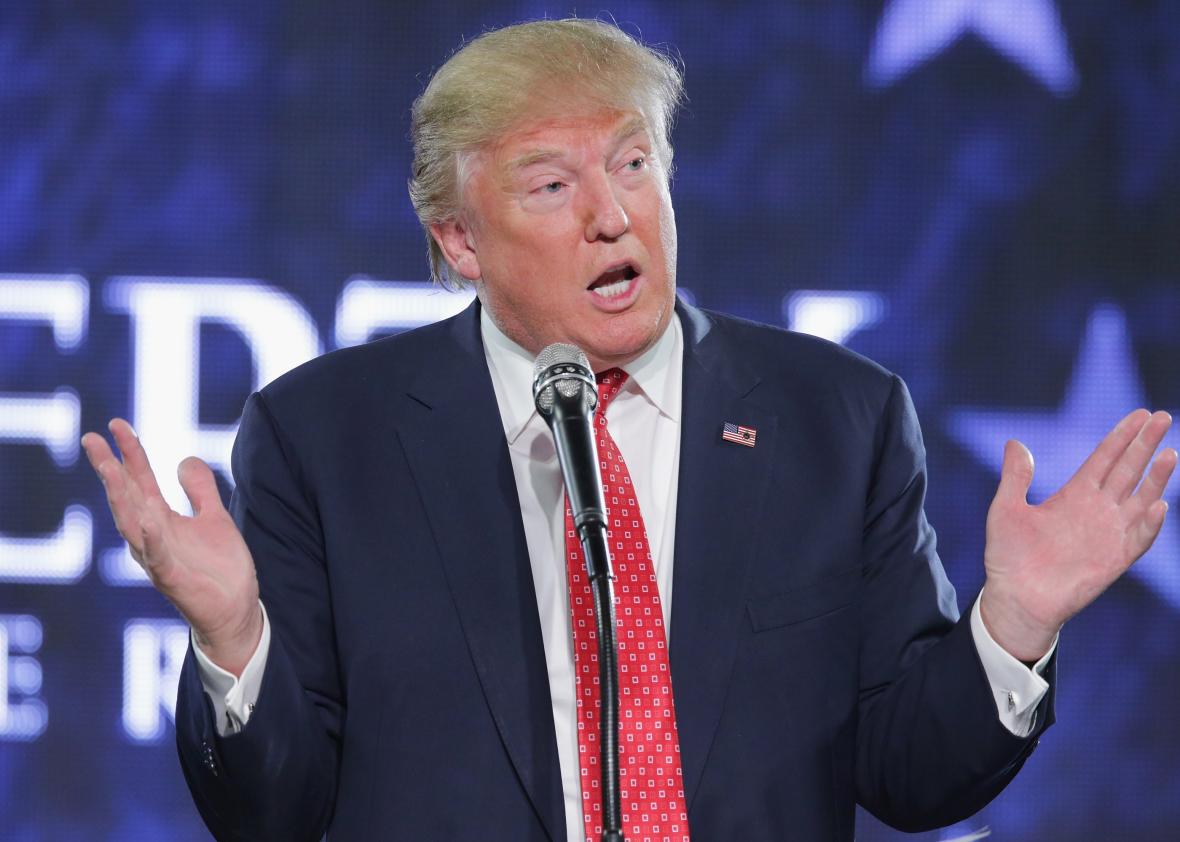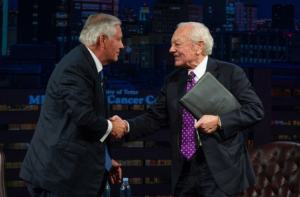The Full Rex Tillerson Interview That Enraged Donald Trump Tells a Different Story: This Distorted Houston Moment Takes On New Meaning — Get the Real Truth
BY Shelby Hodge // 12.11.18Former Secretary of State Rex Tillerson and CBS political consultant Bob Schieffer on stage at the Hilton Americas-Houston.
On December 6, former Secretary of State Rex Tillerson sat down with CBS political contributor Bob Schieffer for his first interview since being fired by President Donald Trump in March. The occasion was the M.D. Anderson Cancer Center “Conversation With a Living Legend” series, held at the Hilton Americas-Houston.
Much of the conversation was taken out of context resulting in an insulting tweet from President Trump.
In the interest of fair play, we post the vast majority of the conversation, unedited, between Tillerson and Schieffer.
Schieffer: How would you describe Donald Trump?
Tillerson: I had never met Donald Trump until the day he asked me to be Secretary of State. I got a call from Vice President elect Pence asking if I would come up and talk to the President elect because people had told him to talk to me because he really knows the world. And so I went up just to do that and I said, well I’ll come up but I don’t want to go through the front door where all you guys and your cameras were hanging out, auditioning every cabinet secretary.”
Schieffer: “We’re like that,” he chuckles
Tillerson: And I said, you guys give me a way to come in where nobody’s going to notice me. They said, ‘OK, we’ll do that.’ So I went up and I went in through their family residence entrance at the back and we sat in his office and we talked for about an hour and a half just walking our way around the world. And then he goes into this sales pitch, and says ‘I want you to be Secretary of State.’ And I was stunned. Steve Bannon was sitting there and he said, ‘You look surprised.’ I said, I am surprised because I’ve got a job. And then he said, ‘Well aren’t you retiring soon?’
So anyhow, that’s kind of the way Donald Trump is. He acts on his instincts. So in some respects, it looks like impulsiveness and I guess in some ways it is. But it’s not his intent to act on impulse. I think he is really trying to act on his instincts.
He is a challenging individual. It’s challenging for me coming from the disciplined, highly process-oriented ExxonMobil Corporation where everybody sang from the same hymn book or get kicked out of the choir and to go to work for a man who is pretty undisciplined, doesn’t like to read, doesn’t read briefing reports, doesn’t like to get into the details of a lot of things, but rather just kind of said, ‘Look this is what I believe and you can try to convince me otherwise. But most of the time you’re not going to do that.’
So really, for me, it was a challenge of: ‘OK, I see your objective.’ And I’ll be very frank with you, I could sign on with just about all of his suggestions. They’re good for America. Our differences were always on tactics, how do you want to achieve that and I had a view of what had worked for me for 25 years of dealing with world leaders and he had a view of his own. So it was always a challenge to have him try and consider a different approach because he’s very confident in himself, he’s very confident in his instincts. . . and I would remind myself, he’s the President of the USA.
The American people chose him. He’s the only one that chose me. So I had to understand for myself how to manage that relationship to help him achieve it’s objectives. So it was a very challenging relationship because he has his own unique style in managing and managing issues.

Schieffer: What is his style?
He tapped into something that was felt very strongly by the American people and then he used the tools of the day to advance that view. I will be honest with you, it troubles me that the American people seem to want to know so little about issues that they are satisfied with 128 characters description of it. But I don’t blame that on Donald Trump. I have to acknowledge and accept that look he figured it out, that all he had to do was put it in 128 characters and people would get on the train with him. So I don’t want that to come across as a criticism of him. It’s mainly a concern I have about us Americans and us as a society and us as citizens that we are unwilling to invest the effort to understand these deeply complicated issues that are so consequential in our future and even more consequential in the future of our children and our grandchildren. So I think one of the great challenges we have as a society is how are we gonna do that in a world where people like 128 characters and call it quits.
Schieffer: I don’t know how to ask this, so let me just ask, how did your relationship go off the rail?
Tillerson: Well, I think part of it was obvious. We are starkly different in our styles. We did not have a common value system. I’ll just be blunt about that and so often the President would say, ‘Well, here’s what I want to do and here’s how I want to do it.’ And I had to say to him, Mr. President, I understand what you want to do, but you can’t do it that way. It violates the law. It violates the treaty. He got really frustrated when we had those conversations. And I’d say now here’s what we can do. If you want to do that, we’ve got to go back to the congress and we’ve got to get that law changed. And there’s nothing wrong with that. And I told him I’m ready to go up there and fight the fight if that’s what you want to do, you want to change this law. I’ll go up there and handle it. But I think a lot of it was I didn’t know how to conduct my affairs with him any other way but in a straightforward fashion. And I think he grew tired of me being they guy who had tell him he can’t do that, let’s talk about what we can do.
Schieffer: That’s very, very interesting. Do you wish you were back there how do you feel about your service?
Tillerson: I’m very proud of my service. One of the most often asked questions that I’m asked is ‘If you knew then what you know now, would you have still said yes?’ And without hesitation I said yes. This was an opportunity for me to to serve, serve my country. I’m a Vietnam era guy and when I turned 18 to register for the draft, I got my lottery number and my number was 89, pretty low number to get drafted to go to Vietnam. But my draft board had a random year and only got to 86. I stayed in college, got my engineering degree, hired by a fantastic company, had a career that is only a fairly tale career with a company that I could not have been prouder to be associated with every minute I was there.
But when it was all said and done I would reflect on the fact that my father fought in the war in the Pacific and my uncle served in Vietnam. And I had never put a uniform on. And so serving my country in a direct way was very important to me. So given the opportunity to do that. I said yes. I really didn’t have to think it over a whole lot. And I would go back in a heartbeat. I was prepared to continue for as long as the President wanted me. I told him when I accepted the job, I said there is one thing you have to understand. I will never quit. I’ve never quit anything in my whole life and I’ll never quit. So when that day comes, it will be up to you.
Schieffer: Over the years, I’ve heard countless people say, if you would just run the government like a business everything could be fine. Now you’ve done both, you’ve been there are done that on both sides. What’s your answer to that question?
I can tell you the challenge was even greater than I thought. And I had dealt with the government a lot. Obviously, while I was at ExxonMobil I had a lot of dealing with government agencies and the departments. And so I knew the challenges. But when I got to the State Department, I kind of sized things up. And it was worse than I thought, frankly. But I tried to kind of pick the big things and take the same approach that I would take during my career with Exxon where we about move around different organizations and we needed to do things to try to improve the performance of that organization. And so we did initiate a considerable effort to identify what are the things the State Department could do to be more efficient, more effective and deliver on the mission better.
And I made that an employee led effort which we had done a couple of times at Exxon with great success. I told the people that look your’e going to run this because I won’t be here. You will. Your whole career is in front of you. And we had at the end of that effort we had done about 15 keystone projects that we thought would dramatically improve things at the State Department. And I sent a note the folks on the project team a couple of months ago that Congress had appropriated the first $290 million for implementing the keystone projects. So I’m proud of the people that are there that stuck with it. So you can improve things, you can make a difference.
You know it’s really hard, in many respects I understand how hard it is for career government employees like in the State Department where every four years, sometimes every 14 months, their going to get a new leader. So this continuity of purpose and this continuity of message and standards that the private sector is able to deploy with great effectiveness you know when your president of ExxonMobil for 13 years and chairman and cEO for 11 years, it’s tough for people to wait you out. So you can insert that and make it stick. When people look up and they know when the next election is and they know that you may not even make it to the next election, there’s not many of them that want to work that hard to fix it because they say . ‘Well the next guy just comes along and comes up with something different.’ And that, I think, is the greatest challenge, how to create within the government system of career employees that it’s in their best interest to do this. You do it because it’s for you. It’s not for me. Do it because you’re going to have a better workplace, you’re going to have better results, you’re going to feel better about what your doing. And you’re going to be serving the American people better. But getting that instilled in a cultural way is very difficult to do when you have the often changes in leadership that we have.
Schieffer: You know, Ronald Reagan used to ask the question in the heat of the campaign: ‘Are you better off now than you were four years ago?’ Are we better off now than we were two years ago?
Tillerson: Well, I think on the domestic front, in many ways we are. The economy, everyone can see the numbers. I think the economy while I was still at ExxonMobil and I was on the executive committee of the business round table for the entire time I was chairman and CEO, it was obvious to all of us that this American economy was just waiting to spring into action.
You were being held back under the previous administration by a tax code that is not competitive, globally. And being held back by a very oppressive hand of regulation. Just over-regulation. Regulation on everything minutiae and duplicate regulations within agencies. And I think one of the things that President Trump said he was going to do, and he did, was to quickly get tax reform passed and begin the process of unwinding some of this very oppressive regulation. None of us are saying that we shouldn’t have regulations. We gotta have rules to play by. But it becomes so oppressive that business risk takers and investors and people who would expand their businesses are simply unwilling to do it under those conditions. So as soon as those two issues were solved, suddenly this domestic economy exploded and that’s what we’re seeing today.
Now, I think on the foreign policy, foreign affairs front, it’s hard to say. Of course, we’re not even a full two years into this presidency. I think we have to be fair and let things play out also. President Trump inherited probably one of the worst set of foreign affair challenges of any president during my lifetime. Our relationship with the Middle East with all the Middle East leaders is at an all-time low. They have lost all faith in the United States because of what we have stood by and let happen in Syria Because of the way we are dealing with Iran.
So there was a real deterioration of their faith and confidence in us. We had Isis on the rise because of the instability in Syria, which spread into Iraq. We had Russia misbehaving in the Ukraine already. We had China on the rise economically and building islands and militarizing those islands and threatening our role in the Pacific. And we have new tools being deployed that had not been used much in the past, in terms of sovereign capabilities. So I think when you look at the table that this President had to come in and sit down at, it would have been very easy for him to just throw his hands up and say ‘Let’s just get through these four years and not get in a fight with anybody.’ He didn’t do that. And hasn’t yet.
And I think we began to just take those on one by one with policies that are designed to take us to an outcome that we can live with and keep the American people safe. North Korea, Afghanistan policy, the Iran policy, free and open Pacific policy. I think if I had any concerns or reservations about it, it’s what Bob Gates alluded to in his video, I do understand and well understood that one of the great strengths that America has enjoyed for the last century is we have many, many allies and friends all over the world. Russia and China have few. We should not take that strength lightly. In fact, we should be strengthening it because we earned that through blood and (undistinguishable) in prior wars.
We earned it by never being a conqueror, we were always liberators and when we liberated a country . . . I was reminded of that very vividly on my first trip to the Philippines where I went out to the American cemetery and I was visiting with people out there and they reminded me that when we liberated the Philippines, rather than taking over a territory we could have taken, we gave it all back and the only thing we asked was to just give us enough land to bury our war heroes. And that is all that we’ve ever asked from the countries that we liberated.
That set us apart from our adversaries and the rest of the world knows that and we have to continue to reinforce that.























